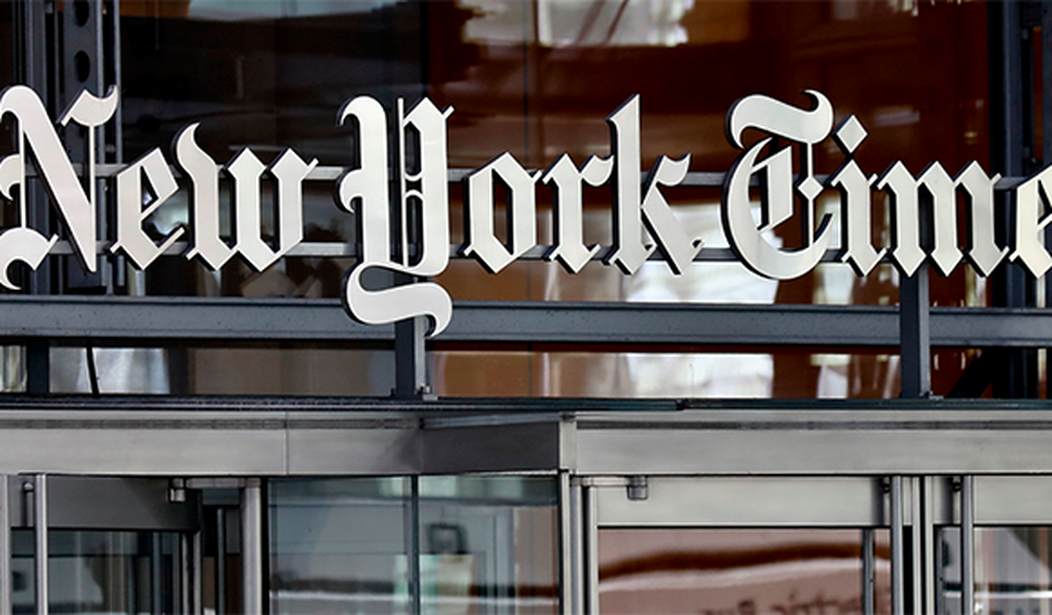Just how bad is cancel culture getting in the United States these days? Bad enough that the New York Times editorial board felt compelled to write an extensive analysis of the problem and announce a series of upcoming pieces on what might be done to address it. To be sure, their argument included some very weak attempts at whataboutism, somehow concluding that “conservatives do it too” by pointing to recently passed laws regarding books and curricula in public schools and parents’ roles in such decisions. (Just for the record, when the government limits speech legislatively, that’s a First Amendment issue. When a mob shuts down your business or gets you thrown off of social media, that’s cancel culture.) But when you read between the lines in the Times editorial, it pretty quickly becomes clear that the liberal editorial board at the paper recognizes that the crisis is almost entirely emanating from their side of the ideological aisle.
Our era, especially, is not made for this; social media is awash in speech of the point-scoring, picking-apart, piling-on, put-down variety. A deluge of misinformation and disinformation online has heightened this tension. Making the internet a more gracious place does not seem high on anyone’s agenda, and certainly not for most of the tech companies that control it.
But the old lesson of “think before you speak” has given way to the new lesson of “speak at your peril.” You can’t consider yourself a supporter of free speech and be policing and punishing speech more than protecting it. Free speech demands a greater willingness to engage with ideas we dislike and greater self-restraint in the face of words that challenge and even unsettle us.
You likely won’t be surprised to learn that many on the left felt ambushed by this admission of reality in the pages of the Paper of Record. Many immediately rebelled and pushed back. Demonstrating an almost hilarious lack of self-awareness, Dan Froomkin at Presswatchers responded to the Times‘ complaints about cancel culture by demanding the cancellation of the paper’s editorial board for daring to speak the words.
The New York Times editorial board should retract and resign
It’s hard to imagine a more fundamental misreading of the freedom of speech – or an organization whose credibility depends more on understanding it correctly – than today’s lead editorial from the New York Times editorial board.
The First Amendment asserts a right to free speech. It does not assert a right to not be criticized for speech. In fact, it protects critical speech.
And the protection is against government action, not against other people.
Reason’s Robby Soave offers a more (dare I say) “reasonable” analysis of the Times editorial and the public response to it. He also falls into the trap of conflating actual public debate with what he describes as “conservative attempts to legislate away uncomfortable discussions about sex and race in schools.” (Which may indeed wind up being held as a First Amendment issue in some instances.) But his overall recognition of the corrosive effects cancel culture is having on society is mostly on the mark.
The opinion pages of The Times host a diversity of viewpoints, of course; just last week, the paper published a guest essay by Emma Camp, a University of Virginia student and Reason contributor, about the culture of self-censorship she encountered on campus. Camp’s piece generated a massive backlash on social media from the very sort of cancel-culture-denying liberals The Times is criticizing in its editorial. As Politico’s John Harris put it, “The torrent of mockery that greeted her on Twitter made the case about the hazards of saying something unpopular more persuasively than she could have imagined.”
While Froomkin is absolutely correct when pointing out the difference between protection against government suppression of speech and retaliatory strikes by other citizens, he still woefully misses the mark. The basic argument that he and others are attempting to make can be summed up thusly: Only the government can violate the First Amendment. And since cancel culture comes from the private and corporate sectors, it can’t be a First Amendment violation, therefore it’s fine.
This would be a completely valid argument if we were only talking about speech, but that’s not the case at all. Froomkin sprinkles in many examples of actual contrasting speech, claiming that the First Amendment doesn’t protect you from “being shamed” or “being called out.” Those are perfectly sound examples. But he then goes on to ignore the fact that the liberal gang mentality actually shuts down businesses, impacting people’s employment opportunities. It results in people being hounded away from businesses or their place of employment. In some cases, the mob can force employers to fire people they find to be insufficiently woke out of fear of mob retaliation, even if they never would have fired them originally for things the worker said completely outside of the context of their business.
That difference is an important one and the factor that drives a huge hole in the liberal embrace of cancel culture. What we’re really talking about here isn’t censorship or the suppression of speech, but rather a domestic form of the economic warfare that has become so popular of late. Only in this case, the guns are aimed at corporations or even individuals rather than entire nations. The tech giants and major social media outlets provide more ammunition by limiting or eliminating access to channels that now comprise the primary platforms for effective speech, acting much more like public utilities in that regard than simple companies with a product to sell.
That is the distilled reality of cancel culture and it shouldn’t be allowed to hide behind the skirts of the First Amendment. It’s no longer enough to come across speech you disagree with and offer a counterargument in response. You should even be able to attempt to “shame” the person in public, as Froomkin put it. But no. That won’t suffice. The person must be hounded from the public stage to ensure they don’t attempt to voice unpopular thoughts again. And if at all possible, the mob should seek them out and push the person’s employer to end their ability to earn a living and the members of the mob should hound them away from places of public gathering until they effectively become prisoners in their own home.
If you can’t tell the difference between that and simple disagreements and public debate, I really don’t know what to tell you. But you’re not defending free speech. You’re embracing a new form of mob violence, even if the violence is primarily economic rather than physical in nature.








Join the conversation as a VIP Member